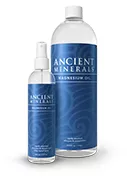Magnesium supplementation is recommended for a number of reasons, given magnesium’s startling impact on the body’s central processes. Several types of magnesium supplements are available, though some are superior to others.
Magnesium serves hundreds of functions within the body and is an important part of bone health, heart health, a healthy nervous system, cellular energy, hormone regulation and the relaxation and activation of muscle tissue. Three quarters of all Americans eat a diet that is deficient in magnesium, according to a report published by the World Health Organization. 1
Yet low magnesium is exceedingly simple to correct.
And, for those who experience side effects such as diarrhea when taking oral supplements, transdermal magnesium is available, which makes increasing magnesium intake as easy as taking a bath or applying a lotion.
Types of Magnesium Supplements
There are a number of types of magnesium available, which vary by delivery and form of magnesium.
Oral Supplements
Oral forms of magnesium are swallowed and pass through the digestive tract. Tested levels of absorption of oral magnesium supplements vary from 4% absorbed to about 50%.
Mineral Salts of Magnesium
These forms of magnesium are typically minerals or salts found in nature, such as magnesium chloride, a common component of sea waters.
Another term used for these types of magnesium supplements is “inorganic”, however this can be misleading as this form is often closest to the forms of magnesium actually found in nature.
Mineral salt forms of magnesium supplements include:
|
|
Magnesium chloride has been found to have the highest bioavailability of the above types of magnesium, due to its superior solubility in water. In fact, water solubility has been found to be directly related to supplement absorbability, as it is believed that the “non-saturable” component of magnesium absorption in the digestive system is related to “solvent drag”, the mechanism by which minerals and electrolytes accompany solvents such as water in the process of digestion and absorption. 2
Magnesium oxide is a common compound in the earth’s crust, comprising 35% of its content by mass. However, it has been found in medical studies to have one of the lowest degrees of bioavailability, as low as 4% bioavailable in one study. Therefore, most experts do not recommend magnesium oxide as the magnesium supplement of choice. Magnesium oxide is used in most store -bought brands of magnesium supplements due to its low cost.
Magnesium Acid Complexes
These forms of supplements represent acids bonded with magnesium, typically in a laboratory environment, to form a complex between magnesium and a compound of hydrogen, oxygen and sometimes carbon and nitrogen, known by chemists as an “organic compound”.
These types of magnesium are often referred to as “organic salts” of magnesium, as they are organic in the manner defined by a laboratory chemist, not in the manner defined in agriculture. Since they are typically not derived from food or plants, they cannot classify as “organic” by USDA standards.
They include:
|
|
*Both magnesium aspartate as well as magnesium glutamate break down into neurotransmitters that, when not bound with other amino acids, are neurotoxic.
Amino Acid Magnesium Chelates


Chelated magnesium supplements are a type of biological acid complex in which the magnesium is bonded to an amino acid containing nitrogen, one of the basic building blocks of proteins.
Due to the complex chemical processes required to produce amino acid magnesium chelates in the laboratory, chelated supplements tend to be among the most expensive choices in magnesium supplements.
Magnesium amino acid chelates include:
- Magnesium Glycinate
- Magnesium Lysinate
- Magnesium Orotate
- Magnesium Taurate
Acid complexes of magnesium and their subset, amino acid chelates, are generally more readily absorbed by the body. They rely not on solubility but on protein pathways for bio-availability.
Only magnesium chloride, a magnesium mineral salt with extremely high solubility, has been found in medical studies to match or surpass the absorption of these forms of magnesium. Magnesium chloride is found naturally in sea water. The purest forms of magnesium chloride are sourced from the ancient Zechstein sea, an underground source which has been protected from modern impurities.
Transdermal Magnesium


Magnesium applied to the skin can be absorbed directly into your cells, bypassing the digestive system. Transdermal or “topical” magnesium products work in a way that is similar to transdermal patches, such as those used for birth control or smoking cessation.
Transdermal magnesium is becoming more and more popular amongst those struggling to achieve a healthy daily intake of magnesium, especially those who experience side effects associated with oral magnesium and the GI tract.
Oral Magnesium and Diarrhea
Unlike oral magnesium, transdermal magnesium does not produce negative side effects such as diarrhea.
Many users of oral magnesium have found that they experience intolerance and side effects after relatively low doses, limiting the amount of oral magnesium that can be taken daily.
Transdermal magnesium has provided a convenient solution to this dilemma, and a powerful means of increasing magnesium intake. Adding magnesium oil spray, magnesium bath salts or magnesium lotion to a normal morning or evening routine is simple and straightforward, and does not require the swallowing of pills or coordination with meals.
For those who seek massage treatments as a part of their health regimen, transdermal magnesium is also available as a magnesium gel and magnesium lotion, specifically formulated for use in massage.
Transdermal magnesium therapy is typically delivered using magnesium chloride, due to its stability, bio-availability and naturally occurring abundance. Magnesium chloride is the most soluble and absorbable magnesium of the various ionic salts, and is derived in a natural state from seawater sources.
Types of Transdermal Magnesium
There are four basic types of transdermal magnesium products:
   |
Magnesium oil |
   |
A component of Magnesium gel that you won’t find in the oil is glide. Usually consisting of an extra ingredient to provide that extra gliding ability, the gel is used mainly in massage applications. |
   |
Magnesium bath flakes are relatively self-explanatory in that they’re a solid form that can be diluted in your bath water. |
   |
Finally the topical application comes in the form of a magnesium lotion, or “magnesium cream” which normally contains a very light concentration of the mineral for those with sensitive skin. |
Benefits of Magnesium Supplementation
The most notable advantage of magnesium is its place as a fundamental nutrient. Since magnesium is required by the body’s cells for energy production, enzyme activity and a host of other functions, its use not only improves the symptoms associated with deficiency, but also supplies every cell in the body with a vital and much needed nutrient.
However, sufficient magnesium intake is the exception, not the norm. Especially in industrialized nations, chronic low magnesium intake is on the rise, and researchers such as Mildred Seeling, author of The Magnesium Factor, hold the “silent epidemic” of magnesium deficiency responsible for poor heart health and increased cases of metabolic syndrome around the world. 3
Given an increasing awareness of the problem of low intake and its accompanying impacts on health, magnesium supplementation has become more and more common among health-conscious adults.
The benefits of magnesium supplements are:
- They are affordable and widely available.
- There is a history of scientific research supporting magnesium’s health benefits.
- Magnesium is very safe when taken at normal dosages, except in cases of kidney disease.
- Magnesium is an essential mineral absolutely required by the body for normal function.
Magnesium is a member of the group of essential vitamins and minerals that cannot be manufactured within the body. Adequate amounts must be achieved through a combination of diet and supplementation. And because sufficient levels of magnesium are both required and actively regulated by the body, supplementing with magnesium has almost no side effects. Diarrhea, which may be encountered with oral supplements, is not experienced when using transdermal magnesium.
The positive impact of magnesium supplementation has been linked to many troubling conditions, and may prove an unexpected solution for those still seeking help. Adequate magnesium is necessary for proper cell function, so correcting a deficiency in magnesium can have reverberations throughout the body’s systems.
According to clinical trials, conditions that have responded to magnesium supplementation include:
- Migraine headaches 4 5
- Depression 6 7
- Diabetes 8 9
- High Blood Pressure 10 11 12
- Asthma and immune health 13 14
For those experiencing the symptoms of magnesium deficiency and those suffering from chronic diseases related to magnesium deficiency, supplementation of magnesium is often recommended by health practitioners as a first line of treatment, and in many cases problems will resolve upon receiving adequate intake. In other circumstances, magnesium can provide an affordable adjunct to other treatments, helping ensure that the body is functioning effectively alongside other therapies.
Why Isn’t Magnesium Recommended More Often?
Though magnesium has been used in acute treatments for decades, such as the use of intravenous magnesium for high blood pressure during pregnancy (preeclampsia), many doctors are unfamiliar with the potential of magnesium except in these emergency scenarios.
Meanwhile, many researchers believe increased magnesium intake could drastically lower rates of chronic symptoms related to insulin resistance, heart health, nervous system disorders, and pain from muscle cramps and tension. More and more research and information is being made available regarding the benefits of magnesium supplementation, and scientists are beginning to understand the factors that link, for example, magnesium’s use in preeclampsia and its benefits toward heart health.
A solution has been published in the Journal of the American College of Nutrition by Doctors Dierck-Hartmut Liebscher, MD, and Dierck-Ekkehard Liebscher, MD.
In their paper, entitled, “About the Misdiagnosis of Magnesium Deficiency”, they recommend lowering the threshold for diagnosing magnesium deficiency. Doing so, they state, will capture the great many people whose low magnesium levels often go unrecognized.They then recommend magnesium supplementation therapy whenever symptoms or diseases potentially related to low magnesium are present. The doctors conclude:
Based on experience, it is our on conviction that many patients with so-called exclusion diagnoses (as for example, attention deficit hyperactivity disorder (ADHD) or chronic fatigue syndrome (CFS) would have their symptoms improved through Mg therapy.—Similarly, patients with diagnoses of depression, epilepsy, diabetes mellitus, tremor, Parkinsonism, arrhythmias, circulatory disturbances (stroke, cardiac infarction, arteriosclerosis), hypertension, migraine, cluster headache, cramps, neuro-vegetative disorders, abdominal pain, osteoporosis, asthma, stress dependent disorders, tinnitus, ataxia, confusion, preeclampsia, weakness, might also be consequences of the magnesium deficiency syndrome.” 15
Magnesium supplements are a safe, effective way to ensure an adequate magnesium intake. Magnesium supplementation therapy is recommended by both researchers and health practitioners when encountering common signs of low magnesium.
And for those who fall in high risk groups for magnesium depletion, magnesium supplements may be a necessary element of maintaining good health. Dr. Carolyn Dean, MD ND and author of The Magnesium Miracle has said:
To obtain enough magnesium from the diet takes special care and knowledge of magnesium-rich foods, but we still need to supplement with magnesium.” 16
Not all magnesium supplements are created equal. For the best combination of convenience and bioavailability, seek a combination of foods containing magnesium, a transdermal magnesium product for convenience that bypasses problems associated with the GI tract, and a dosage of oral magnesium that does not produce side effects.

